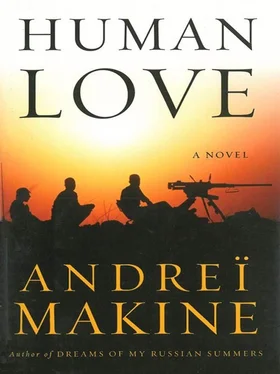They approached with uneasy caution, not knowing what could be said at such a place. Thousands of lives swallowed up by this enclosed space between the watchtowers. Thousands of pairs of eyes staring long ago at barbed wire, all downy with hoarfrost under a cloudless sky. Were cries of pity called for, or indignation, or resignation? Words lost their meaning here. From a blackened pole hung a steel bar, the gong that had once marked the rhythm of the camps activities. Its silence, perpetual now, was like an invisible but still living presence.
Elias listened to the wind, the crunching of their feet, pictured the man Anna had just been speaking about: one sunny day a prisoner clad in a worn quilted jacket leaves the camp, stops, looks back, perplexed. After twelve years of imprisonment, freedom is a threat. His body worn out by penal servitude, betrays him at every step. He finds it hard to understand the people he passes, their smiles, their concerns. “You should have remarried,” he says to his wife. He is terrified by that wait of twelve years. Terrified and sorrowfully grateful. He would like to thrust this woman away from him, thrust her toward joy, toward the youth she had lost on his account… He dies a year after the birth of their daughter. As a child, Anna will claim she remembers her fathers face. It is, of course, impossible. She has simply seen old photos…
Elias noted the moment when the cold suddenly ceased. They walked around the camp, entered a wood of black alders. He took off his scarf and no longer felt the wind’s cutting edge. The young woman facing him seemed breathtakingly close, known to him, as no one had ever been in his life before. He even thought he could recall the voice of the child she had been! As well as all those winter days she had lived through before they met. With the faith of a believer, he guessed at the sadness and beauty of what her eyes remembered. And, like an intoxication, he sensed the silence of the house where, as a small child, she would observe a beam of light from the setting sun on the picture of a soldier, then a branch covered in hoarfrost turning blue outside the window… Now, with the same intensity, he felt at one with the suddenly milder air Anna was breathing, and with the roughness of the bark lightly touched by her hand…
These were the trees the camp authorities had had cut down to put an end to the birdsong. Elias looked up: high above them the bare branches, encrusted with ice jewels, rang softly in the wind, like an echo of the warbling of long ago… His shapka slipped, fell into the snow. He picked it up but was in no hurry to put it on, he was so hot.
I’m here at last… The notion took shape, confused, yet expressing vividly what was happening to him. The serene truth of his presence here, in this place of forgotten evil, in the dazzle of a snowy plain, beside a young woman, thanks to whom everything on this day was turning out to be of the essence of things, even the simple beauty of the tips of her eyelashes silvered with hoarfrost. Life was becoming as it ought to be.
“Mother comes here once a year, at the beginning of June,” Anna said. “On the anniversary of my fathers death. She spends the night here. I came with her once. When you hear the birds you don’t really believe in death anymore and it feels as if he can hear them too… Wrap up well. Its time to go home.”
He felt at one with every tree, with every glint of the low sun on the snow. Or rather he felt at one with himself in that day, which seemed always to have been waiting for him, and into which he was finally returning. Anna’s hand, adjusting his scarf for him, emerged out of a very old memory, heady with tenderness. He grasped her fingers, pressed them to his face, closed his eyes… When they continued on their way, he unbuttoned his coat; the air seemed to him balmy, aromatic. And already in the darkness on the outskirts of Sarma, his breath became so scorching that he felt that with one puff he could have warmed up all the ancient, chilled izbas of the hamlet.
That night, amid the furnace of his fever, a moment of great limpidity burst forth. I love her…, he admitted to himself with disarmed simplicity. Anna was standing on the threshold of the room.
Next day, the eve of their departure for Moscow, Annas mother gave them the money the people of Sarma had collected so that they could return by plane.
During the nine hours that the flight lasted, breathless from his illness, Elias swung between an absolute certainty of happiness and an awareness of never being able to recapture the radiance of that other life briefly glimpsed. It would have meant returning to Sarma, to live there with Anna in perpetual, humble, slow joy, rhythmed by the ebb and flow of the seasons. His cough had him by the throat; he was breathing like a hunted animal and told himself that Anna had done everything in her power to escape those long, somnolent winters, the bleak memory of the dead. No, he would have had to take her to the islands of Luanda beneath the sun, redolent of the warm algae and the hot timber of the boats. He sat up In his seat and began to talk of the fishermen, silhouetted against the sunsets, of the woman, his mother, waiting for their return. They would go and settle there, she would love the country… Suddenly he remembered who he was: a young African, stateless, a half-monkey to those who occupied Angola. The tangled knot that derived from these thoughts drew ever tighter. At one moment Anna’s face appeared to him shrouded in darkness, unrecognizable. Who was she, in fact, this woman offering him a pill and a glass of water? Was it she who had paused in the midst of endless snows and made alive and necessary every moment that passed? Or a young woman from the provinces who wanted to stay in Moscow at all costs? And what was there to be done about the scent of hoarfrost that her dress exhaled when she climbed back into the train? And about the poem she had loved in her youth: a knight going down into the arena among the big cats and retrieving the glove a lady had let fall? And about the child in a silent izba , talking to the photo of a soldier?
He felt profound pity for this child, now grown into an adult. Instead of the scraps of dreams he could offer her, she ought to do everything possible to succeed in Moscow, far from those endless winters, from those phantom camps. She ought to marry this Vadim, this nice, gentle Daddy’s boy. If only that could make her happy…
Had he said all that in a moment of delirium? Had she replied? At all events it was during the flight that she told him her secret: to be admitted to the university she had lied and told them her father had been killed in the war. She lived in fear of being unmasked, sent back, ending up in Sarma…
Toward evening, during a few minutes of calm, he looked out of the window. Barely tinged with pink by a dull sun, a uniform white expanse lay there, the same ever since their departure. The freedom of these spaces was intoxicating, gave one the desire to travel through them in every direction, to land anywhere, to take off again. And yet amid this immensity Anna’s life traced a fragile line, suspended from a lie, stretched between this dreamed-of Moscow and the ice hell of her native village. A little like the glimpses of a road down below, amid fields under snow.
She came to see him every day while he was convalescing. They spoke little, disconcerted by the doomed nature of the choice that their trip had just laid bare: Moscow, Sarma, a calculated happiness here, at the cost of renouncing an improbable happiness back there. Destiny, a precise line that must be followed without deviation. The magnanimity of fantasies, the wretchedness of common sense. And the scent of the forest in winter clinging to a woman’s clothes as she climbs back on board a train…
Читать дальше









